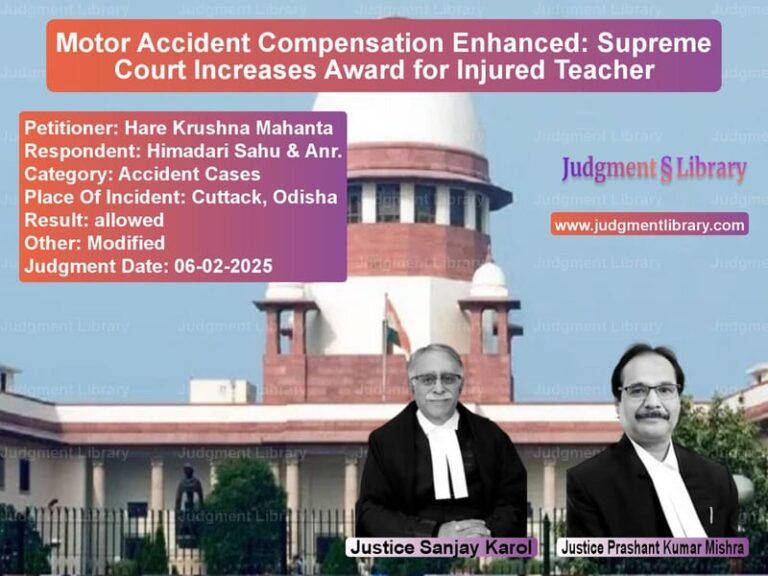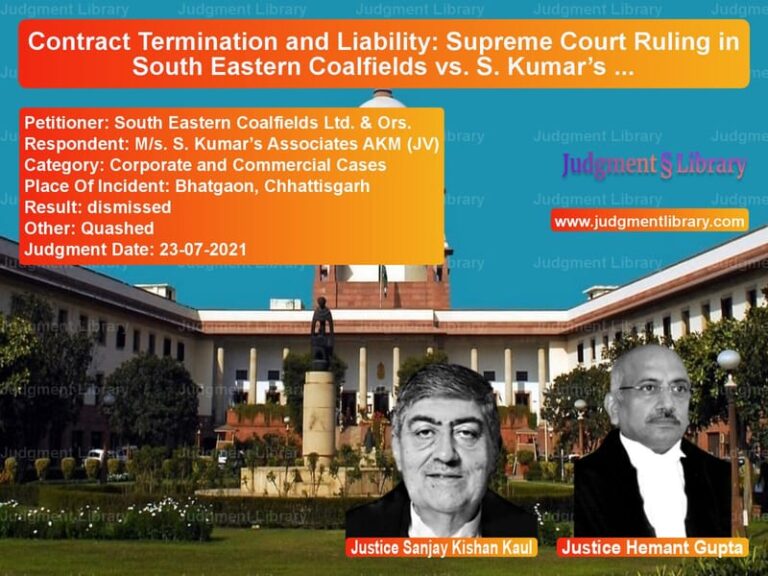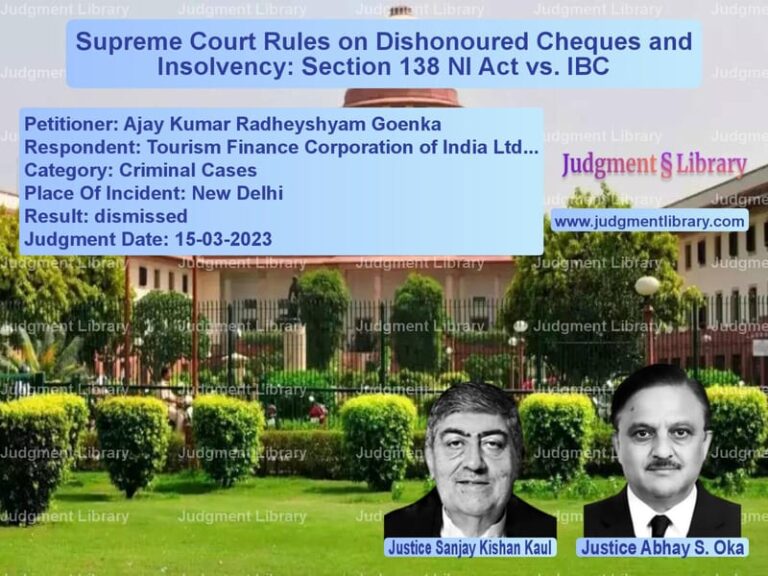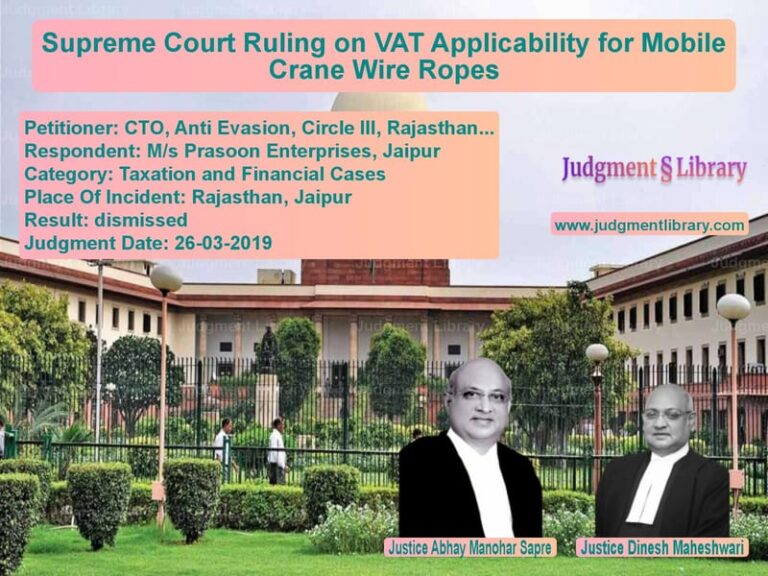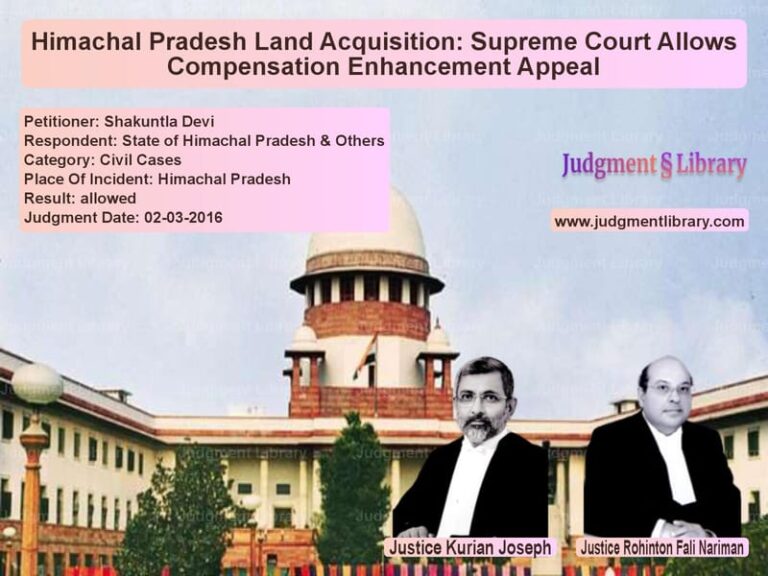Dispute Over Property Ownership and Adverse Possession: Supreme Court Remands Appeal for Reconsideration
The case of Sri. K.M. Krishna Reddy vs. Sri. Vinod Reddy & Anr. revolves around a dispute concerning the ownership and possession of an immovable property after the death of the appellant’s father. The dispute involves the question of whether the respondents had perfected their title to the suit property by way of adverse possession and whether the appellant, who claims ownership through a family settlement, had the right to seek an injunction against the respondents who allegedly interfered with his possession.
Background of the Case
The appellant filed a suit for a perpetual injunction against the respondents for interfering with his possession of the suit property. He claimed that after the death of his father, the suit property was allotted to his share under a family settlement executed in 1993. The appellant argued that he was in exclusive possession of the property and that the respondents had tried to interfere with his possession in 1994.
On the other hand, the respondents filed a written statement claiming that they had been in continuous possession of the property since 1978. They argued that the property was allotted to the appellant’s brother, Jayarama, in the partition of the family estate, and that they had acquired title through adverse possession. The respondents also raised the defense that their mother had entered into an agreement for sale with Jayarama and had paid consideration for the property, thus reinforcing their claim of ownership.
Legal Issues and Submissions
The primary issue in the case was whether the appellant was in possession of the suit property on the date the suit was filed, and whether the respondents had perfected their title by adverse possession. The respondents contended that their claim of adverse possession was valid, while the appellant maintained that the respondents had no legal claim to the property and had been wrongfully interfering with his possession.
The appellant argued that the High Court had wrongly dismissed his suit by focusing on the issue of the amendment of the plaint. He contended that the family settlement established his title to the property, and the respondents had failed to prove their adverse possession claim. The appellant also submitted that there was no need for a declaration of title, as the respondents’ title had never been established.
In contrast, the respondents argued that the appellant’s suit was not maintainable as the property was not in his possession at the time of the suit’s filing, and that he should have sought a declaration of title along with an injunction. They further asserted that the appellant’s claim of exclusive possession was false, as they had been in uninterrupted possession of the property since 1978, with the knowledge of the appellant and his family members.
Findings of the Courts Below
The Trial Court dismissed the appellant’s suit and decreed the respondents’ counterclaim for declaration of ownership based on adverse possession. On appeal, the District Court reversed the decision and ruled in favor of the appellant, granting an injunction to protect his possession. However, when the respondents appealed to the High Court, the High Court set aside the District Court’s order, ruling that the amendment to the plaint seeking a declaration of title was time-barred under the Limitation Act. The High Court held that the amendment could not relate back to the original suit’s filing date, leading to the dismissal of the appellant’s suit.
Supreme Court’s Judgment
The Supreme Court, after hearing both parties, concluded that the High Court’s decision to dismiss the appellant’s suit was incorrect. The Court clarified that the dispute in this case was not about the appellant’s title to the property, as it was admitted by the respondents that the appellant’s father had owned the property. The main issue was whether the appellant could claim possession of the property, and whether the respondents’ claim of adverse possession had merit.
The Court observed that while the respondents claimed adverse possession, their own pleadings contradicted this claim. The respondents admitted that their mother had entered into an agreement for sale with the appellant’s brother, Jayarama, and had been put in possession of the property under that agreement. This part of their defense directly contradicted the claim of adverse possession, as adverse possession requires hostile possession against the rightful owner. The respondents could not claim both that they had been in peaceful possession for decades and that they had acquired title through an agreement for sale.
In light of these findings, the Court noted that there was no dispute about the appellant’s title, as the respondents had admitted it. Therefore, the appellant’s original suit for injunction was maintainable, as he had a right to protect his possession against the respondents’ interference. The Court also noted that the issue of adverse possession raised by the respondents required further examination, as the burden of proof was on them to establish their claim.
The Court found that the High Court had only dealt with the issue of limitation related to the amendment of the plaint and had not considered the merits of the suit and counterclaim. Therefore, the Court decided to remand the case to the High Court for further consideration of the remaining issues, including whether the appellant was in possession of the property on the date the suit was filed and whether the respondents had proved their claim of adverse possession.
Legal Precedents Referenced
The Supreme Court referred to the landmark decision in Anathula Sudhakar v. P. Buchi Reddy (2008), where it outlined the general principles regarding when a suit for injunction is maintainable and when a suit for declaration and possession is required. The Court reiterated that a suit for injunction could be filed when the plaintiff is in lawful possession of the property and is being threatened with dispossession. However, when the title of the plaintiff is under dispute or there is a claim of adverse possession, the plaintiff must seek a declaration of title in addition to an injunction.
Final Decision and Directions
The Supreme Court partly allowed the appeal, setting aside the High Court’s judgment and remanding the case for reconsideration. The Court directed the High Court to frame additional substantial questions of law and proceed to decide the regular second appeal in accordance with the law. The High Court was also directed to prioritize the disposal of the case, given the lengthy pendency of the appeal since 2007.
Implications of the Judgment
This judgment provides important clarification on the principles governing suits for injunction and adverse possession. It reinforces the notion that a person who is in lawful possession of a property can seek an injunction against a person who threatens their possession, even if there is a dispute about the title. The Court also emphasized the need for clear evidence when claiming adverse possession, as it cannot coexist with claims of peaceful possession under an agreement for sale.
Conclusion
The case of K.M. Krishna Reddy vs. Vinod Reddy underscores the importance of establishing clear title and possession in property disputes. The judgment reiterates that while a suit for injunction may be sufficient to protect possession, the defendant’s claim of adverse possession must be substantiated with proper evidence. The remand to the High Court ensures that all issues, including adverse possession, are fully examined and decided in accordance with the law.
Petitioner Name: K.M. Krishna Reddy.Respondent Name: Vinod Reddy & Anr..Judgment By: Justice Abhay S. Oka, Justice Pankaj Mithal.Place Of Incident: Karnataka.Judgment Date: 06-10-2023.
Don’t miss out on the full details! Download the complete judgment in PDF format below and gain valuable insights instantly!
Download Judgment: k.m.-krishna-reddy-vs-vinod-reddy-&-anr.-supreme-court-of-india-judgment-dated-06-10-2023.pdf
Directly Download Judgment: Directly download this Judgment
See all petitions in Contract Disputes
See all petitions in Property Disputes
See all petitions in Damages and Compensation
See all petitions in Judgment by Abhay S. Oka
See all petitions in Judgment by Pankaj Mithal
See all petitions in partially allowed
See all petitions in Remanded
See all petitions in supreme court of India judgments October 2023
See all petitions in 2023 judgments
See all posts in Civil Cases Category
See all allowed petitions in Civil Cases Category
See all Dismissed petitions in Civil Cases Category
See all partially allowed petitions in Civil Cases Category


